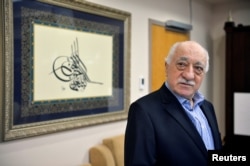The Turkish government says the state of emergency that went into effect following the failed coup on July 15 will be extended another three months, beginning October 19. Deputy Prime Minister Numan Kurtulmus spoke to reporters Monday following a Cabinet meeting.
The main opposition CHP has condemned the move.
The dispute threatens rare political consensus between President Recep Tayyip Erdogan’s ruling AK party and the CHP, forged out of opposition to the attempted military takeover that left more than 270 people dead. The declaration of emergency rule and ensuing crackdown against those allegedly involved in the failed military takeover have led to the CHP saying Turkey is in the grip of a counter coup.
In the Yenikapi district of Istanbul in August, well over a million people attended a rally to oppose the coup attempt. The rally overcame the country’s deep political polarization, bringing together the CHP and AKP.
The rare consensus was dubbed the “Yenikapi Spirit.” On the night of the coup attempt, the leaders of Turkey’s main political parties united in condemning the attempted takeover; however, the government declaration of the initial state of emergency in the aftermath of the failed coup, with 30,0000 arrests and 100,000 people losing or being suspended from their jobs, dealt a near fatal blow to hopes of a new era of political consensus.
“If what is happening is the 'Yenikapi Spirit,' I want no part in it,” declared CHP leader Kemal Kilicdaroglu, in a briefing to foreign journalists Friday. “We are in a process where the government is using the coup to expand its power and silence the opposition.”
During the briefing, Kilicdaroglu cited the arrest of more than 100 journalists, closure of media institutions and seizure of more than 200 companies as examples of abuses of emergency powers, which allow the government to rule by decree. Last week, 20 more TV and radio stations were closed by decree, including a Kurdish children’s cartoon channel.
Court fight looms
Kilicdaroglu has pledged to fight emergency rule in parliament and the constitutional court.
“Erdogan will continue to rule, even if this is quite strident opposition from CHP, given that he can continue to rule by decree, by sidelining parliament,” said Sinan Ulgen, a visiting scholar at Carnegie Europe in Brussels. “But there is as well a critical milestone and benchmark, which will be the decision of the constitutional court. The opposition party case is strong as there is legal precedent.”
The CHP has filed a case challenging government decrees issued under emergency rule; but, Kilicdaroglu has questioned whether the constitutional court will be able to challenge Erdogan’s AKP government.
Thousands of judges have been detained under emergency rule, including two members of the Constitutional Court.
The reopening of Turkey’s deep political divide could have far-reaching consequences. “There was an opportunity (of unity), but Erdogan did not take the opportunity to use it properly. And that can only empower the evil dynamics of polarization in the country, at a very, very unsuitable moment in the wake of the coup,” Kilicdaroglu said.
Erdogan argues the CHP leader is out of touch with his supporters, and that there remains a strong political unity and wide support for the crackdown. The government alleges it faces an unprecedented challenge of trying to remove a vast network run by followers of U.S.-based Turkish cleric Fethullah Gulen from the state and society. The government in Ankara accuses Gulen of orchestrating the coup attempt, an allegation he denies.
Opposition worried it is next
There still remains consensus between Turkey’s two main parties over the threat posed by Gulen’s followers, but CHP leader Kilicdaroglu argues the corruption of power now poses a greater threat to Turkey.
“They (government) can now close every institution they want, any newspaper they want; imprison whomever they want. It can make every businessman go bankrupt and seize their properties," Kilicdarolgu said. "They are becoming addicted to this kind of power. This is the greatest danger against our democracy process."
Erdogan has promised his government will not let up on the crackdown, suggesting the state of emergency could extend beyond a year, saying the country is facing unprecedented dangers and that parliament is incapable of dealing with them.
Kilicdaroglu says they are preparing for the worst, warning his party too should expect to be targeted in the crackdown. “This threat will come and find us, but we will not be silent against this threat. We will fight against it until the end.”






